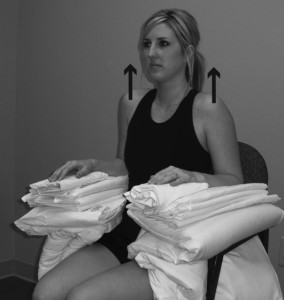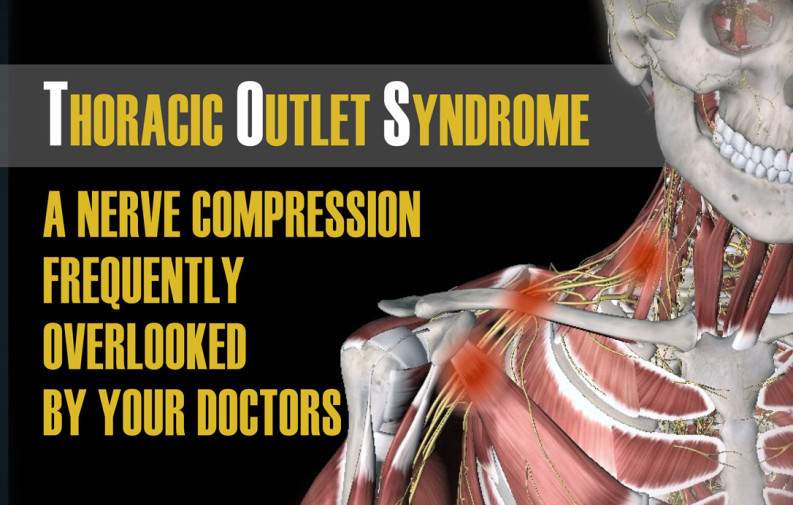Thoracic outlet syndrome (TOS) is an umbrella description for compressions of the nerves or vessels going from your neck to your arm. It is often overlooked by doctors because the symptoms vary greatly among patients.
90% of TOS is related to the nerves, rather than the artery or vein. (1) Because of that, I’ve encountered many TOS patients who were never correctly diagnosed and were wrongly treated as having a pinched nerve in the neck.
-
Thoracic outlet syndrome vs. nerve root compression
Symptoms of neurogenic TOS is very similar to that of nerve root compression, or a pinched nerve. In either case, you are likely to experience pain, abnormal sensation, numbness, tingling, and/or weakness of the neck, shoulder, arm, and/or fingers.
The main differentiator is the distribution of the symptoms. Nerve root compression typically follows a very specific pattern of the nerves being compressed. On the other hand, neurogenic TOS will normally not produce symptoms that follow a single sensory or motor nerve pattern. (2)
-
Best way to diagnose neurogenic thoracic outlet syndrome
Nerve conduction velocities and electromyography testing are reliable ways to diagnose neurogenic TOS. The down side is that the tests require inserting needle electrodes into the muscles and sending electrical impulse through your nerves, so there will be some discomfort.
This is not to say that your doctors cannot diagnose TOS without this advanced testing. In fact, if the right combinations of tests are done during a physical exam, the sensitivity and specificity of correctly diagnosing neurogenic TOS is 90% and 84%. (2)
-
Surgical vs. non surgical treatment
Surgery may be indicated for the kind of TOS that involves the artery and vein. On the other hand, surgery for neurogenic TOS is more controversial.
Conservative treatment should certainly be considered first. Most of the patients with neurogenic TOS can expect good or very good results with conservative treatment. (3) What are some factors that will work against your odds to heal? Obesity and additional nerve compressions on top of the TOS. (3)
BONUS: A home exercise to help you sleep through the night
One of the most common complaints of patients with TOS is hand and arm numbness in a side sleeping position that wakes them up at night.
A study (3) has described a home exercise that may effectively help you sleep through the night. Before going to bed, sit in a chair with your shoulders passively elevated. Passively means that you are not actively engaging your muscles to keep the shoulders in this position. Your symptoms should decrease over time, but may not completely resolve at the beginning. You should remain in this position as long as you can tolerate it. Your symptoms may not decrease during the first few sessions, but they should resolve more quickly as you repeat over time. After a few weeks of consistent exercise, you may be able to sleep through the night without waking.

Photo credit: http://www.ncbi.nlm.nih.gov/pmc/articles/PMC3109687/
Reference:
- Sanders RJ, Hammond SL, Rao NM. Diagnosis of thoracic outlet syndrome. J Vasc Surg. 2007 Seo;46(3):601-4. [PubMed]
- Hooper TL et al. Thoracic outlet syndrome: a controversial clinical condition. Part 1: anatomy, and clinical examination/diagnosis. J Man Manip Ther. 2010 Jun;18(2):74-83. [PubMed]
- Hooper TL et al. Thoracic outlet syndrome: a controversial clinical condition. Part 2: non-surgical and surgical management. J Man Manip Ther. 2010 Sep;18(3):132-138. [PubMed]
About the Author
Dr. Lily Semrow is a Board Certified Chiropractic Neurologist who focuses on Neuro-Structural Correction. She has a B.S. in Nutrition and a doctorate in Chiropractic. She has a passion for serving families, and helping people who could not get better through traditional and alternative means.

